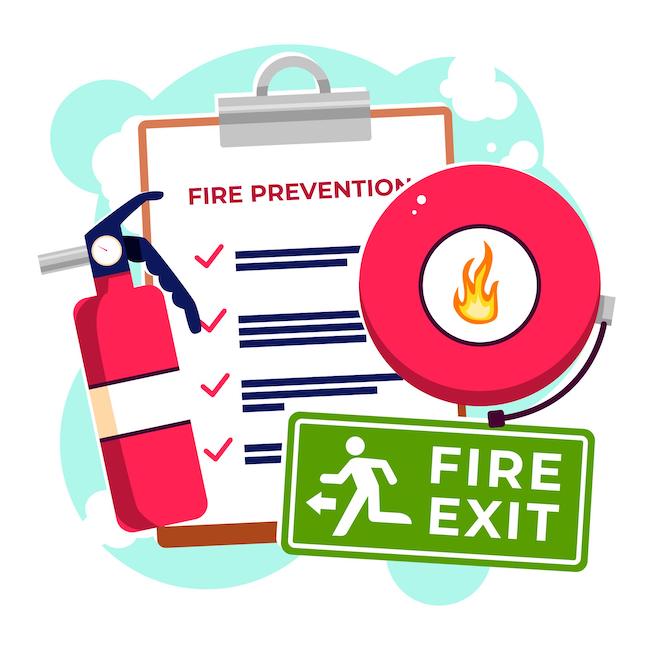Fire safety is a critical aspect of any business operation, ensuring the protection of employees, customers, assets, and infrastructure. Businesses must take proactive measures to prevent fire hazards and establish comprehensive emergency response plans. One of the most essential components of fire safety is installing and maintaining fire alarm systems, which play a key role in early fire detection and prevention. This article outlines the key steps businesses should take to enhance fire safety and prevent potential disasters.
Conducting a Fire Risk Assessment
The preliminary activity in enhancing fire safety is the execution of a meticulous fire risk evaluation. The method includes the identification of probable fire hazards, the assessment of risks, and the introduction of required security measures. Companies ought to make an evaluation of the places in which the fire risks are more frequent, for instance, the kitchens, electrical rooms, and storage areas that are packed with flammable materials. Including the fire alarm systems in these hazardous areas ensures the early detection and the immediate response to any fire cases.
Installing and Maintaining Fire Alarm Systems
A properly installed fire alarm system is crucial for detecting smoke, heat, or flames and alerting building occupants in time to evacuate safely. Businesses should choose fire alarm systems that comply with local regulations and industry standards. Regular maintenance, including testing alarm functionality and replacing faulty components, ensures that the system remains operational. Routine inspections by certified professionals can prevent false alarms and identify system malfunctions before they become serious issues.
Providing Fire Safety Training for Employees
Fire prevention and response majorly hinge on the active participation of the employees. One of the steps that a company can take is to ensure that employees are educated through fire safety training sessions on the fire hazards, emergency evacuation procedures, and the right way to use fire extinguishers. Training programs should underscore the need for fire alarm systems as, first of all, detecting fires and, secondly, making people take emergency action. Staff who have received extensive training in fire protection practices are often the ones who react efficiently to an event, thus, they are the very ones who can prevent injuries and property damage.
Putting an Evacuation Plans in Place
No business is complete without a thoroughly documented evacuation plan that conditions safety and order during a fire. Evacuation plans must have clear signposting points, and exits to the emergency should be free of any barrier at all times. Fire drills should be held on a regular basis so that workers would learn the routes for evacuation and where to gather. Using fire alarm systems together with emergency lighting and exit signage that is illuminated with lighting will help guide people towards safety.
Fire Prevention through Suppression Systems Installation
Fire suppression systems like sprinklers and fire extinguishers play a key role in controlling as well as getting rid of fires before they become uncontrollable. Businesses must install the right kind of fire suppression equipment based on the types of operations they carry on. Periodic inspections, as well as maintaining the function of suppression systems, are needed in cases where they are taken into use. Most of the time fire alarm systems are related to fire suppression systems, that is, they are the ones who start them automatically when they get a signal from smoke or heat.
Electrical Safety Standards Should Be Upheld
Wiring that is broken or overloaded circuits due to malfunctioning electrical appliances are the two top common causes of commercial fires. In order for businesses to uncover any threats to safety, it would be a good idea for them to have regular power line inspections. The use of electrical equipment and appliances that meet the required Standardization holds down the rate of short circuits and overheating. Fire alarm systems that are not running optimally are left on to detect electrical fires very late, giving business owners the chance to come to action quite late.
Dealing with Flammable Materials and Storage
The right way of storing and handling flammable materials is effectively a fire risk-reducing program. Companies should store fuels, chemicals, and combustible materials in sufficient ventilation facilities in designated environmental areas. Using fire-resistant storage containers and cabinets will solve the problem of accidental ignition. In addition to fire alarm systems being set up close to storage areas for rapid detection, businesses also need to ensure fire exits are easily accessible.
Collaboration with Fire Safety Professionals
Companies should engage with fire safety professionals to come up with and implement efficient fire prevention strategies. Professional fire safety consultants can do system audits regularly, give guidance on system upgrades, and ensure businesses comply with fire safety regulations. Peace of mind comes with reliable and effective fire alarm systems that are serviced by professionals. By consulting experts, the seats of the businesses will keep abreast with the times in regard to new fire safety technologies and best practices.
Regular Fire Drills and Inspections as Measures
Conducting fire drills is one of the best methods that can be used for cementing fire safety protocols and for also preparing workers for the actual emergencies. Businesses should make it a point to conduct drills on a regular schedule to test evacuation effectiveness and find out areas that still need work. Routine checks of fire alarm systems and other fire fighting gear confirm all the parts are operational and ready for deployment. Quality and safety are also results of continuous monitoring and proper evaluation of fire safety measures.
Summary
The enhancement of fire safety and the prevention of businesses must be a multifaceted approach that involves not only adequate risk evaluations and the correct installation and maintenance of fire alarm systems but also employee training and adherence to safety regulations. The implementation of fire suppression systems, the evacuation plan, and regular inspection as proactive measures, can help businesses reduce fire risks and better the safety of the workplace. Through fire prevention not only the people and property get protected, fire safety regulations get followed as well, thus creating a secure and flourishing business environment.







